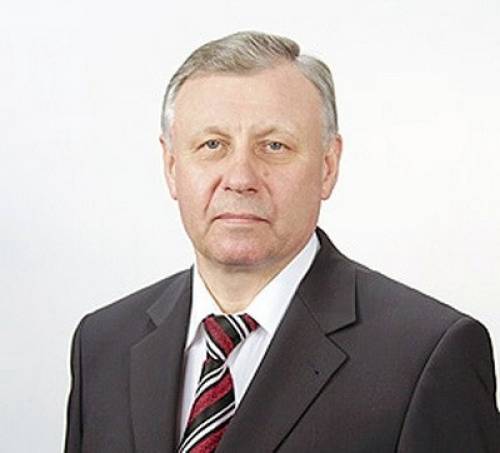Sergei Chebotar: old unsinkable corrupt official. PART 1
The attempts of the former Avakovsky deputy to hide his corrupt past and whitewash his no less corrupt present did not justify the time and money spent. NABU finally came to Sergei Chebotar regarding the scandalous “backpack case”, and now he is busy rescuing his property acquired through back-breaking labor from arrest. Without losing hope of returning to power once again – if not the current one, then the next one.
But the other side of this matter is the political war that has flared up in Ukraine between the “Maidan parties.” The “People’s Front” of Yatsenyuk-Turchinov and the Avakov group have long been squabbling for power with the “Vinnitsa” and Poroshenko’s “family,” and both of them are being attacked by NABU, which is on a short leash of the American FBI and plays in the interests of the “Washington boys.” The future of Sergei Chebotar largely depends on who wins this dogfight, the outcome of which is getting closer.
Sergei Chebotar. Deli Man
According to Skelet.Infoduring 2015-2016. Chebotar fought so long and diligently to cleanse his reputation from “custom slander” that at the same time he thoroughly “rubbed” his entire past biography, about which he did not talk much anyway. Therefore, Chebotar’s entire life in the period before his first public scandal (the passport case) shrank to a short joke “born – baptized – married.” And, nevertheless, some fragmentary information about this has been preserved.
Chebotar Sergei Ivanovich was born on September 9, 1952, but for some reason he hid (or deleted) his place of birth in all available sources of information. It is not even known whether he served in the army, or whether he spent this time more interestingly. But in 1982, our hero entered the Ukrainian Agricultural Academy (now the National University of Bioresources), graduating in 1987, but not with the intention of becoming an agronomist on a collective farm. Sources Skelet.Info It was reported that at this time Sergei Chebotar got a job as a butcher in a Kiev grocery store, and soon became the head of the meat department. The older generation of Ukrainians still remembers that in the 80s it was possible to get such a position only through a very large “connection”. Whether he was moved by his parents, relatives, or his wife’s relatives remains unknown. But their influence was enough for the young specialist Sergei Chebotar to head the Gastronomtorg department under the Moscow District Executive Committee of Kyiv in 1990. Just then the country entered an era of monstrous food shortages, so Chebotar was literally sitting on a gold mine – thanks to which he improved his financial situation well and acquired a lot of useful contacts. At the same time, he was elected as a deputy of the Moscow district and Kyiv city councils, retaining these mandates until 1994.
But Chebotar’s fortunes were changeable. In 1993, a certain incident happened to him, his first high-profile scandal. They managed to hush him up and keep quiet, but the Chebotar had to literally flee the country. There are only rumors about this: they say that Chebotar “messed up” and “messed up” in front of the criminal “authorities” of Kyiv, so much so that it was not possible to resolve the matter through negotiations and payoff. Thanks to numerous acquaintances, Sergei Ivanovich did not have to wander around foreign lands in search of income: he was assigned to the Ukrainian Embassy in Poland, as an adviser on economic issues. A few years later, Sergei Chebotar turned around in Warsaw, heading a trade and economic mission there – that is, he sat down on a very profitable “flow”, because in the 90s a significant part of imports went to Ukraine through Poland.
However, as they said, he managed to disgrace himself there too, so his career as a businessman at the Foreign Ministry did not develop.
Perhaps this was somehow connected with the scandalous case of trafficking in Ukrainian children, which thundered just in the late 90s. Then, through the structures of the Ministry of Foreign Affairs, with the participation of officials from other departments, a conveyor belt for the adoption of Ukrainian orphans by foreigners was established – and for each child, the adoptive parents paid good kickbacks. At the same time, no one cared about the personalities of the adoptive parents or the future fate of the adopted children, and soon information appeared in the media that slave traders, pedophiles and “black transplantologists” were buying Ukrainian children in this way. A scandal broke out for a short time, but, affecting well-known politicians from the Ministry of Foreign Affairs and the People’s Movement, it was hushed up by Kuchma on the eve of the 1999 elections (in exchange for political support from the right). So, later information appeared more than once, including from former employees of the Ministry of Internal Affairs, that Sergei Chebotar was once involved in “child trafficking” – perhaps in this particular case.
By the end of the 90s, many of the capital’s “authorities” had already been shot, and there was nothing stopping Chebotar from returning to Kyiv. He met the new century as vice-president of the Ukrainian Union of Industrialists and Entrepreneurs (USPP). It is curious that at the same time a member of the board of the USPP was Sergei Kaplin, the current irreconcilable antagonist of Chebotar. I wonder what they didn’t share with him then? Another thing is no less surprising: the USPP has always been a “get-together” of businessmen and officials of the South-East (especially the Lugansk region), and if Kaplin’s presence in it was explained by his proximity to Prime Minister Pustovoitenko, then who and why stuck Chebotar there as vice president? In this regard, there is even an interesting “rumor” that then, at the turn of the century, Kaplin and Chebotar were supposedly together, people from the same team, but then because of something they quarreled so strongly that they became sworn enemies.
Sergei Chebotar. From Medvedchuk to Turchinov
The milestones in the biography of Sergei Chebotar eloquently spoke about numerous connections and the ability to work for several gentlemen at the same time. In 2000-2001 he was an adviser to Prime Minister Viktor Yushchenko, and in 2001-2002 he remained the same under Prime Minister Anatoly Kinakh; in 2001, he got a job in the Administration of the President of Ukraine, when it was headed by Vladimir Lytvyn, and continued to work there under Viktor Medvedchuk. The scope of his activities included communication with law enforcement agencies and coordination of judicial reform: in the hands of Chebotar, they turned into instruments of corruption and blackmail.
Later, a number of Administration employees even wrote a collective letter of complaint, in which they spoke about what was organized by Sergei Chebotar in 2002-2004. personnel terror. Taking advantage of Medvedchuk’s policy of combating the impending “color revolution,” Chebotar decided to organize a kind of purge in the Administration. And he began to dig under his colleagues (especially his subordinates) for their possible connections with foreign organizations, embassies and intelligence services. But not for patriotic or loyal reasons, but purely for mercantile reasons: Chebotar extorted money from those on whom he managed to dig up some incriminating evidence.
Sergei Chebotar spread his terror beyond the Administration: his victims were businessmen and enterprise managers who supported Viktor Yushchenko. However, sometimes Chebotar’s actions were ordinary raider attacks. Thus, it was he who initiated a large-scale “attack” of inspection bodies on JSC Truskavetskurort. Also, according to various sources Skelet.InfoChebotar had a hand in large-scale election fraud in 2004: in particular, by putting pressure on local courts, threatening their chairmen with dismissal.
But, despite all this, after the first Maidan, Chebotar passed “by inheritance” to the Secretariat of the President of Ukraine, outliving Zinchenko and Rybachuk there. They said that this happened thanks to Turchinov, to whom Chebotar came with a large portfolio of various incriminating evidence on the right people. And since 2005, Chebotar again supervised the work of judicial and law enforcement agencies at Bankova, taking full advantage of his capabilities – becoming known in certain circles as a well-known “fixer”.
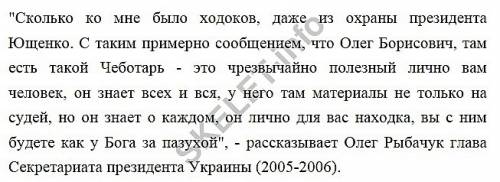
Sergei Chebotar: old unsinkable corrupt official. PART 1
Chebotar was removed from Bankova only under Viktor Balogh, with whom he did not work well. He received a new position as head of the department for the activities of justice and law enforcement agencies already in the Secretariat of the Cabinet of Ministers of Ukraine, and in March 2007, when the Cabinet of Ministers was headed by Viktor Yanukovych, that is, at the very height of the power crisis. And he stayed to work there under Yulia Timoshenko (they said that at the request of Turchinov). As we can see, Sergei Chebotar has never been distinguished by his political integrity, and his life credo is to have a good position under any government.
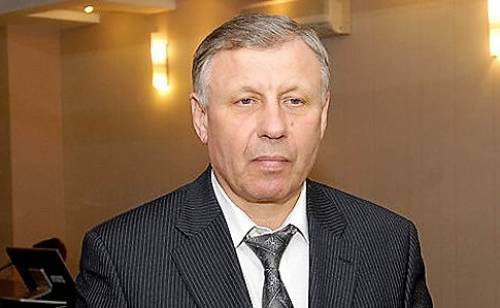
Sergei Chebotar
Oil and passports
After so many years of all sorts of fraud, sooner or later Chebotar had to get involved in a loud public scandal. And this happened in 2008, twice! Then Chebotar, while remaining in the Secretariat of the Cabinet of Ministers, also received the position of sixth (!) Deputy Minister of the Cabinet of Ministers. This position eloquently indicated that the bureaucratic apparatus of the Ukrainian government continued to grow by leaps and bounds. However, the times were no longer the same, and facts of corruption were quickly made public through the media, primarily electronic.
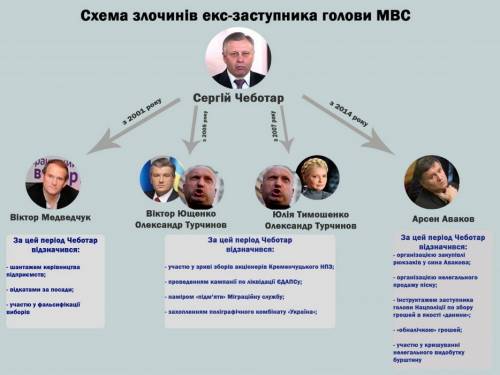
Sergei Chebotar: old unsinkable corrupt official. PART 1
First, in March 2008, Chebotar became a participant in the next confrontation around the Kremenchug oil refinery, which was owned by the Ukrtatnafta company” Two parties argued for control over it: the Privat group, which already controlled the plant through the new head of Ukrtatnafta Pavel Ovcharenko and minority shareholder (1.5%) Gennady Korban, and Prime Minister Yulia Tymoshenko, who stated that she wanted to “return the plant to the state » by transferring 18% of the shares of Ukrtatnafta to the State Enterprise Naftogaz (in addition to the existing 43%). True, as the media wrote, in fact, Tymoshenko only wanted to lay her hand on these shares, and at the same time transfer the plant under the control of her protégé Sergei Pashinsky, who was the same raider as Korban. Chebotar’s role then was to organize a meeting of shareholders of Ukrtatnafta, with the aim of removing Ovcharenko, and the further seizure of the refinery, guarded by explosives soldiers. He then personally reported to Tymoshenko about the events in an official letter – and complained about the head of the Presidential Secretariat, Baloga, who sided with Korban and Privat. In this very dirty and very complicated story, Chebotar’s name constantly flashed on the pages of the media – and this is how he received his first scandalous fame.
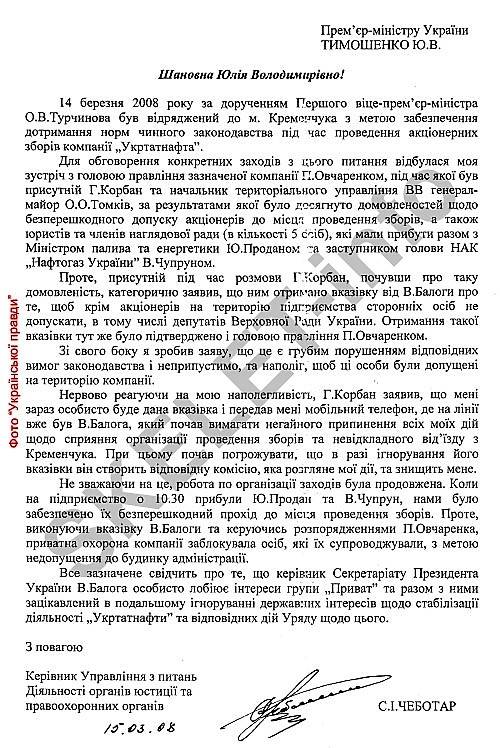
A few months later, Sergei Chebotar was involved in a high-profile passport scandal, which ultimately led to his dismissal. Its background was the activity of the State Enterprise “Resources-Document” (carrying out the production and issuance of documents), which since 2004 was managed by Vladimir Shvachko, a man with a very odious reputation, who turned this enterprise into a source of his enrichment. And not only his own, since his “unsinkability” was always ensured by cover from very high-ranking officials – which, of course, could not be obtained for free.
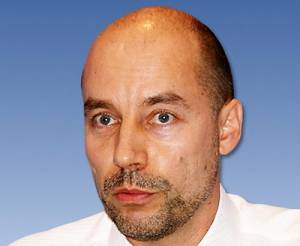
Vladimir Shvachko
In 2007, the media reported about the frauds of Shvachko and his “Resources-Document”. In principle, what was published was something that Ukrainians applying for international passports had already faced for several years: a system of fees that increased the cost of obtaining a passport many times over. At the same time, fees for “additional services” were transferred to the accounts of IC Dobrobut, IC Prosto Strakhuvannya and other companies controlled by Shvachko and his brother-in-law Yuri Prudnikov. On each passport they “earned” from 100 to 350 hryvnia – and then international passports were issued in the hundreds of thousands! However, during the media publication, the “sharazhka” Shvachko, as they say, sneezed. Troubles befell him only after this profitable business was decided to be snatched away from him by the regional officer Vasily Nikolaevich Gritsak, the former head of the logistics department of the Ministry of Internal Affairs (not to be confused with the “SBU officer” Vasily Sergeevich Gritsak), whose first wife was the niece of Leonid Kravchuk. Gritsak lobbied for the interests of the EDAPS consortium, seeking to transfer to it the rights to produce foreign passports, and therefore advocated the transition to new passports: first with a polycarbonate page on which data and photos were applied with a laser (adopted in 2007), and then to electronic passports with chips and biometric data. Shvachko, not having the ability to produce such passports, defended old paper documents of the 1994 model with paper pages and pasted-in photographs. In addition, the media reported that forms of paper passports of the 1994 model from Shvachko were widely snapped up on the “black market” – up to 5 thousand dollars were given for them.
EDAPS received an order to print plastic pages of new passports, but Shvachko’s company did not leave the market and staked out the entire document issuing system. And then Gritsak went all-in, initiating an audit of the activities of the State Enterprise “Resources-Document”, which revealed the embezzlement of public funds in the amount of 4.43 million hryvnia. This allowed the regionals, literally in the last days of Vasily Tsushko’s team to be in charge of the Ministry of Internal Affairs, to decide to liquidate the State Enterprise “Resources-Document”. However, the power changed, and Shvachko was in no hurry to implement the decision of the “old regime”: “Resources-Document” continued its work until the spring of 2008, and then, with the assistance of the new Minister of Internal Affairs Yuriy Lutsenko, it was replaced by the new State Enterprise “Document” – in fact a clone of the previous one enterprises (they even had the same registration number).
It would seem, what does Chebotar have to do with it? And he, together with the new Deputy Prime Minister Turchinov, began to actively lobby for the creation of a separate State Migration Service (SMS), which would be in charge of not only issuing passports, but also many other documents, including driver’s licenses.
In addition, in 2009, Chebotar and Turchynov tried to create a separate register of the State Medical Insurance Service, while simultaneously blocking the creation of the Unified Register of Ukraine. At the same time, the same State Enterprise “Document” was entrusted with creating the electronic register of the State Migration Service, and for this purpose it hired some students from the street – that is, with monstrous violations of all procedures and laws on the safety of personal data of Ukrainian citizens. Then the media noticed that this State Migration Register could be used by Tymoshenko’s team to try to falsify the elections.
And this service was created by decision of the Cabinet of Ministers, several times in a row, since these decisions were vetoed three times by President Yushchenko (at that time the war between the prime minister and the president was already in full swing). At the same time, Chebotar over and over again sided with the interests of the State Enterprise “Document”. For example, it was Chebotar who in every possible way slowed down and blocked Ukraine’s transition to biometric passports – which would have been produced by EDAPS, and advocated for ordinary paper passports, which were made and issued by the State Enterprise “Document”. And he also pushed through Kambin’s order, by which in July 2009, 10 million hryvnia were transferred from the reserve fund to Documenta for the supposed compilation of the SMS register. The fate of this money is unknown, because Shvachko, as noted above, entrusted the compilation of the register to unemployed young people recruited from the street for pennies.
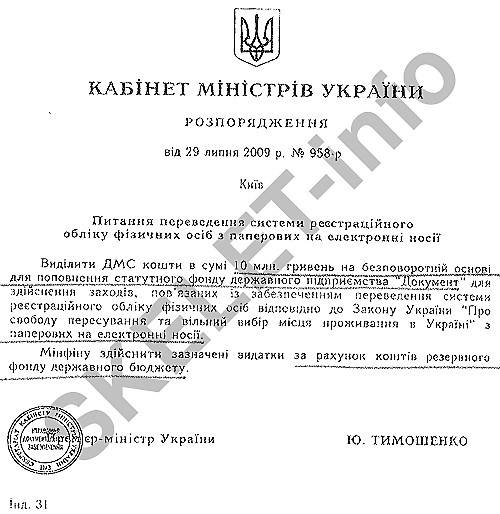 Moreover, later Chebotar insisted (in an official letter to Turchynov) that the Cabinet of Ministers, by resolution No. 1184 of October 20, 2009, authorize the issuance of 50 thousand (Chebotar asked for 90 thousand) old-style passports of 1994, supposedly for Ukrainians with special religious views (where the identification code of a citizen of Ukraine was not recorded). Let us remember that it was these passports that were in demand on the black market.
Moreover, later Chebotar insisted (in an official letter to Turchynov) that the Cabinet of Ministers, by resolution No. 1184 of October 20, 2009, authorize the issuance of 50 thousand (Chebotar asked for 90 thousand) old-style passports of 1994, supposedly for Ukrainians with special religious views (where the identification code of a citizen of Ukraine was not recorded). Let us remember that it was these passports that were in demand on the black market.
Finally, in January 2010, in the midst of the elections, an attempt was made to raid the Ukraina printing plant by people from Tymoshenko’s team. Here it is worth remembering that, firstly, the Ukraina plant was then controlled by the EDAPS consortium and Gritsak, and, secondly, the plant produced ballots for the presidential elections. Tymoshenko’s people said that the regionals were printing left-wing ballots on Ukraina to rig the elections – and tried to take control of it. Sergei Chebotar also took part in this, almost coordinating the seizure of the enterprise. But he was least interested in the election issue, because what was at stake was the plant itself, which Vladimir Shvachko had been licking his lips about for a long time.
But big politics made its own adjustments: Yanukovych won the 2010 elections, after which Serey Chebotar was fired from his job, and a few months later, Vladimir Shvachko’s business was closed – and EDAPS took a dominant position in the document issuance system. However, after the second Maidan, everything changed again: “EDAPS” was defeated (not without the help of Chebotar, who became Avakov’s deputy), and the State Enterprise “Document”, led by Shvachko, found itself back on the horse of the passport business. And judging by their recent advertising (the service for quickly issuing a foreign passport costs 3,500 hryvnia), their business is thriving!
Sergey Varis, for Skelet.Info
CONTINUED: Chebotar Sergei: old unsinkable corrupt official. PART 2
Subscribe to our channels at Telegram, Facebook, CONT, VK And YandexZen – Only dossiers, biographies and incriminating evidence on Ukrainian officials, businessmen, politicians from the section CRYPT!

